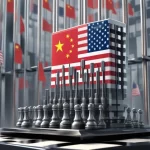Jim Cramer Slams DeepSeek Hype as AI Stocks Rebound Amid U.S.-China Tech Clash

Jim Cramer Dismisses DeepSeek as a Threat to Tech Giants While AI Stocks Surge
Jim Cramer, the fiery financial commentator, has thrown cold water on the hysteria surrounding DeepSeek, a Chinese AI startup that briefly sent Wall Street into a tailspin. On a recent segment, Cramer declared that DeepSeek poses no real danger to U.S. tech titans like Nvidia, AMD, and Broadcom, despite earlier market panic over the firm’s supposedly game-changing AI model. As AI stocks rebound with gusto, the question looms: was this just another overhyped scare, or are deeper cracks forming in the tech landscape that crypto enthusiasts should watch?
- Market Meltdown: DeepSeek’s January AI model release sparked fears of U.S. tech losing ground, with Nvidia dropping $600 billion in market cap in one session.
- Swift Recovery: AI stocks like Nvidia (up 2.59%) and AMD (up 6.83%) have bounced back, alongside major market index gains, undermining initial concerns.
- Cramer’s Verdict: Wall Street overreacted—DeepSeek isn’t the juggernaut it was hyped to be, and U.S. tech remains dominant.
DeepSeek’s Shockwave: A $600 Billion Panic Attack
Let’s rewind to January when DeepSeek, a Hangzhou-based AI outfit, unleashed its DeepSeek-V3 model, touting it as a leap forward in artificial intelligence—both dirt cheap and energy-efficient compared to anything churned out by U.S. giants. For the uninitiated, AI models are the brains behind chatbots, image generators, and predictive systems, built by feeding massive data through powerful hardware until they “learn” to process and respond. The cost and computing power needed for this are often jaw-dropping, so a claim of doing it on a budget sounded like a revolution—or a scam.
Wall Street didn’t wait to find out. Investors freaked out, fearing that companies like Nvidia, a leader in AI hardware with its high-powered chips, could lose their edge to a Chinese upstart. Nvidia’s stock cratered 17% in a single trading day, wiping out roughly $600 billion in market capitalization—that’s the total value of a company based on its stock price and outstanding shares, and yes, it’s the biggest one-day drop for any U.S. firm in history. Other AI and semiconductor players like AMD, Broadcom, Vertices, Microns, and Marvell Technologies took heavy hits too as the market braced for a potential paradigm shift. For more on how this impacted Nvidia’s investors, check out discussions on Nvidia stock reactions.
Cramer Calls It: A Paper Tiger and a Market Overreaction
Fast forward to today, and the doom-and-gloom narrative has imploded. AI stocks are roaring back, with Nvidia climbing 2.59%, AMD surging 6.83%, and Broadcom gaining 3.94% in recent trading. Broader market optimism, partly fueled by geopolitical developments like Middle East ceasefire hopes, has major indices like the Nasdaq 100 hitting all-time highs. Cramer, never shy about calling out nonsense, didn’t hold back on his take during a recent broadcast. For his detailed perspective, see Cramer’s latest analysis on AI stocks.
“Now, looking back, with so much of tech bordering on new highs, it’s clear that these stocks never should’ve been sold in the first place. Because DeepSeek simply wasn’t that meaningful.”
Translation? Cramer’s saying Wall Street had a full-blown toddler tantrum over a threat that doesn’t hold water. The recovery suggests investors jumped the gun, dumping shares based on unverified hype rather than hard evidence of DeepSeek’s capabilities. But let’s not pop the champagne just yet—there’s more to this story than a simple overreaction.
Cheap AI: Genius or Fraud?
What made DeepSeek’s announcement so alarming was its claim of training efficiency. The company bragged that DeepSeek-V3 was built for just $58 million using 2,048 Nvidia H800 chips over about 57 days—equivalent to nearly 3 million hours of high-powered computing time on specialized hardware. This measures the raw muscle and time needed to “teach” an AI system to think and predict. Compare that to Meta, which reportedly spent $500 million on its Llama 3.1 model, and you’ve got a cost disparity that sounds too good to be true. For a deeper look at these claims, explore DeepSeek-V3 efficiency details. For context, these costs cover everything from hardware to energy to data processing, often making AI development a billionaire’s game.
Here’s the rub: those numbers haven’t been independently verified. If DeepSeek’s pulling a fast one, it wouldn’t be the first time a tech player hyped vaporware to spook competitors or inflate its worth. Bitcoiners know this game—think of every sketchy altcoin ICO promising the moon with zero delivery. Markets react to buzz, not always to substance, and DeepSeek’s sudden spotlight reeks of that familiar FUD (fear, uncertainty, doubt) cycle we’ve seen tank crypto prices before they rebound on fundamentals. For historical context on the company’s controversies, refer to DeepSeek’s background.
Tech Wars: U.S. vs. China Power Plays
Dig deeper, and the geopolitical stakes come into focus. The U.S. and China are locked in a tech cold war, with AI and semiconductors as key battlegrounds. Since October 2022, the Biden administration has enforced strict export controls, banning advanced Nvidia chips like the A100 and H100 from reaching China over national security fears—think military-grade AI applications. A follow-up ban in October 2023 targeted even watered-down models like the H800, though DeepSeek insists it legally snagged those chips beforehand. For the latest on these restrictions, see DeepSeek’s alleged attempts to bypass U.S. chip bans.
But whispers of foul play persist. A senior U.S. State Department official accused DeepSeek of trying to nab restricted H100 chips through shady Southeast Asian shell companies, a claim Nvidia denies, confirming only H800s were involved. Then there’s the data controversy: reports suggest DeepSeek tapped datasets from Meta’s open-source Llama platform and Alibaba’s Tongyi Qianwen for training, while allegedly sharing user info with the Chinese government. U.S. Commerce Secretary Howard Lutnick slammed this hard.
“[DeepSeek is] creating dirt cheap AI models by purchasing Nvidia chips and using data from Meta’s open platform.”
If true, this isn’t just sharp elbows in business—it’s a privacy gut-punch, the kind of Big Brother nonsense Bitcoin was forged to obliterate. Centralized tech, whether it’s AI or finance, often means someone’s got the keys to your data. For crypto OGs, this is a neon sign flashing why decentralization isn’t optional but essential. For a broader discussion on this threat, check out views on DeepSeek’s impact on U.S. tech.
History adds context here. This isn’t the first U.S.-China tech clash—remember the Huawei bans or earlier chip export skirmishes? Each round tightens the screws on innovation flow, impacting everything from AI to blockchain hardware needs. If China keeps finding loopholes, and companies like DeepSeek leverage U.S. tech on the cheap, it’s not just Nvidia’s problem—it’s a systemic risk to fair competition and data sovereignty.
Centralized AI vs. Decentralized Freedom: A Crypto Wake-Up Call
For those of us in the crypto trenches, DeepSeek’s saga hits close to home. Centralized systems—be it AI giants or legacy banks—are ripe for abuse when one entity holds the reins. Allegations of DeepSeek funneling data to state powers mirror the surveillance risks Bitcoin sidesteps by design. No middleman, no master key, no problem. This mess screams for decentralized AI solutions, where data and power spread across a network rather than pool in a single vault. Think of it as Bitcoin for tech: no overlord can snoop or censor if the system’s truly peer-to-peer.
Projects like SingularityNET and Fetch.ai are already exploring this, blending blockchain with AI to democratize access and protect privacy. Bitcoin remains the gold standard for cutting out centralized overlords, though altcoins like Ethereum offer frameworks to host such decentralized AI tools. Ethereum’s smart contracts, for instance, could underpin trustless AI marketplaces, filling niches Bitcoin doesn’t aim to tackle. This isn’t shilling—it’s recognizing that while Bitcoin’s ethos of autonomy reigns supreme, other chains play vital roles in this financial and tech revolution.
The parallel to crypto doesn’t stop at privacy. DeepSeek’s market shock echoes our own wild rides—Bitcoin’s 2018 crash on regulatory FUD, or altcoin pump-and-dumps on empty hype. Markets overreact, then correct when cooler heads prevail. If Cramer’s right that DeepSeek’s threat is bunk, it’s a win for resilience, much like Bitcoin’s rise from every “death” prediction. But if we’re underestimating China’s long game in AI, the ripple could hit crypto too, from hardware supply chains to global trust in centralized tech alternatives.
Counterpoint: Is Cramer Missing the Forest for the Trees?
Not everyone’s buying Cramer’s dismissal. AI expert Andrew Ng offered a sharper take on social media, pointing to bigger trends beneath the DeepSeek buzz. For more on contrasting opinions, read Cramer’s take on DeepSeek’s reduced threat.
“The buzz over DeepSeek this week crystallized, for many people, a few important trends that have been happening in plain sight: (i) China is catching up to the U.S. in generative AI, with implications for the AI supply chain. (ii) Open weight models are commoditizing the…”
Ng’s warning is clear: even if DeepSeek isn’t the final boss, China’s aggressive push in generative AI—think chatbots and creative tech—signals a race the U.S. can’t afford to slack on. Supply chain impacts could pinch everything from Nvidia’s chip production to the mining rigs Bitcoiners rely on. And let’s play devil’s advocate for a second: Cramer’s banking on stock recovery as proof of no threat, but what if DeepSeek—or copycats—inspire a wave of low-cost AI disruptors? Unverified claims today could be prototypes tomorrow. Wall Street’s short memory doesn’t mean the danger’s gone; it might just be delayed.
Effective Accelerationism: Disruption at Any Cost?
Stepping back with an effective accelerationism (e/acc) lens—something many in crypto vibe with—DeepSeek’s antics, shady or not, might still be a net positive. Much like Bitcoin forced banks to wake up or wither, a player slashing AI costs pushes the whole field forward at warp speed. Progress ain’t always clean; it’s often messy as hell. The catch? Ensuring rapid innovation doesn’t trade freedom for expediency. If DeepSeek’s model fuels centralized control or state surveillance, it’s a hollow win. Crypto’s fight against such overreach reminds us to keep one eye on the prize—tech that liberates, not enslaves. For a comparison of training costs with other tech giants, see DeepSeek’s cost claims versus Nvidia and Meta.
Could DeepSeek’s tech, if ever open-sourced, be remixed for decentralized use, much like Bitcoin forks spawned new ideas? It’s a long shot, but crypto’s culture of hacking and rebuilding thrives on such pivots. The real question is whether we cheer messy disruptors for speeding up tech evolution or slam them for playing dirty. That’s a debate worth having over a cold wallet and a beer.
Key Takeaways and Burning Questions
- Why did DeepSeek rattle Wall Street so badly?
Its January AI model, hyped as cheaper and more efficient, fueled fears that U.S. tech giants like Nvidia could lose dominance, leading to a historic $600 billion market cap drop for Nvidia in a single day. - Why does Cramer think the panic was nonsense?
With AI stocks recovering and tech nearing new highs, Cramer argues the sell-off was a knee-jerk mistake—DeepSeek lacks the muscle to truly challenge U.S. leaders. - How does this tie to crypto and decentralization?
DeepSeek’s alleged data-sharing with state powers exposes centralized tech’s privacy risks, reinforcing why Bitcoin and blockchain are critical for data sovereignty and freedom from surveillance. - What’s the long-term U.S.-China tech rivalry impact?
DeepSeek’s rise, even if overhyped, flags China’s AI ambitions, raising stakes for export controls, supply chains, and global trust in tech—issues that could spill into blockchain hardware and crypto adoption. - Should crypto fans root for disruptors like DeepSeek?
From an e/acc view, yes—disruption drives progress, as Bitcoin proved in finance. But only if it doesn’t bolster centralized control; freedom must trump speed, a balance crypto constantly navigates.
Zooming out, DeepSeek’s drama is a microcosm of a high-stakes tech chess match. Export bans, data scandals, and market swings are just pawns in a game shaping the future of innovation—AI, blockchain, or beyond. For us hodling Bitcoin or betting on a freer tomorrow, it’s a stark reminder: decentralization isn’t a buzzword, it’s a bulwark against centralized power grabs. Cramer may scoff at DeepSeek as a non-issue, but the underlying tensions—privacy erosion, geopolitical games, and raw innovation—aren’t vanishing. They’re the same battles crypto fights daily, and they’re damn worth watching.



